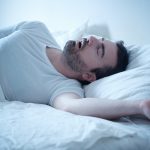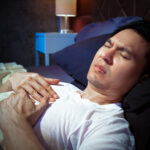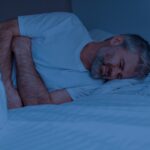March 6, 2019
Sleep disorders affect an estimated 50 to 70 million Americans. When left untreated, sleep disorders can lead to serious health problems including obesity, diabetes, and hypertension. Sleep disorders can also lead to falls, injuries, and accidents.
If you or a loved one is having problems sleeping at night, it’s possible a sleep disorder is the culprit. Our sleep specialists will work with you to uncover the root cause of your sleeplessness, so you can feel better physically and mentally and reduce your risk for serious problems like heart disease and stroke.
Here are the most common types of sleep disorders. If you’ve been exhibiting symptoms of any of these disorders, request an appointment with our sleep clinic today so you can receive treatment right away.
Insomnia
One of the most common sleep disorders, insomnia, is when you have problems falling asleep, staying asleep, or both. You may spend about 30 minutes trying to fall asleep or getting back to sleep if you wake up during the night. Acute insomnia can happen due to stress or a traumatic event and usually lasts for just a few days or weeks. Chronic insomnia is when you experience insomnia at least three times per week for at least three months.
Symptoms of insomnia include:
- Waking up too early
- Staying awake for most of the night
- Sleep for short periods at a time
- Staying awake for more than 30 minutes before falling asleep
- Feeling tired or like you haven’t slept at all
Sleep Apnea
Obstructive sleep apnea occurs when the upper airway collapses or becomes blocked during sleep to reduce or stop airflow. This is the most common type of sleep apnea and the one associated with loud, disruptive snoring. Central sleep apnea is the less common form of sleep apnea and occurs when the brain fails to signal the muscles that control your breathing. When left untreated, sleep apnea can increase the risk of asthma, chronic kidney disease, and cancer.
Symptoms of sleep apnea include:
- Loud, frequent snoring
- Gasping or choking noises during sleep
- Excessive daytime sleepiness
- Headaches after waking
- Irritability and mood swings
- Decreased sexual libido
Parasomnias
This group of sleep disorders is characterized by abnormal and unusual behaviors that occur while you remain asleep. Sleep eating, sleepwalking, sleep sex, night terrors, bedwetting, and sleep talking are all examples of parasomnias. In many cases of parasomnias, the odd behaviors being practiced while asleep hold significant meaning or importance to the person being affected.
Restless Legs Syndrome
Having a powerful, uncontrollable urge to move your legs is known as restless leg syndrome. If you suffer from this sleep disorder, you may experience discomfort in your legs when sitting or lying down. You may also feel as though moving your legs is the only way to relieve your discomfort.
Symptoms of restless legs syndrome include:
- Itching or crawling sensation in the legs
- Aching and throbbing in the legs
- Pulling sensation in the legs
- Increased discomfort in the legs at night
Narcolepsy
Narcolepsy is also known as excessive, uncontrollable daytime sleepiness. Those with narcolepsy experience a strong tendency to fall asleep when doing normal daily activities, such as eating or driving a car. This sleep disorder is also characterized by frequent bouts of interrupted sleep and short periods of rest during the night.
Symptoms of narcolepsy include:
- Hallucinations when falling asleep or waking up
- Overwhelming sleepiness that comes on suddenly
- Loss of muscle tone and voluntary muscle control
- Vivid dreams
- Acting out while dreaming
- Inability to move or talk while falling asleep or waking up, also known as sleep paralysis
Sleep Paralysis
Sleep paralysis affects roughly 8 percent of the general population. This sleep disorder is characterized by a temporary inability to move or speak when falling asleep or just waking up. Episodes of sleep paralysis usually last between one and two minutes. Sleep paralysis can be a scary and terrifying experience and occurs most frequently in those who suffer narcolepsy or sleep apnea.
Symptoms of sleep paralysis include:
- Inability to move, or paralysis
- Anxiety
- Hallucinations
- A sensation of choking or pressure
- Intense fear
At Healthcare Associates of Texas, we understand how important it is for your health to sleep well. We can treat all types of sleep disorders and are devoted to helping you get to the bottom of your sleep problems. Our team of sleep doctors will work with you one on one to ensure you receive a proper diagnosis and the highest quality personalized care and treatment. Schedule an appointment today.
Resources:
https://www.ncbi.nlm.nih.gov/books/NBK19961/
https://www.ncbi.nlm.nih.gov/pmc/articles/PMC5627640/
https://medlineplus.gov/insomnia.html
https://www.nhlbi.nih.gov/health-topics/sleep-apnea
https://medlineplus.gov/sleepdisorders.html
https://www.ninds.nih.gov/Disorders/Patient-Caregiver-Education/Fact-Sheets/Narcolepsy-Fact-Sheet
https://www.ncbi.nlm.nih.gov/pmc/articles/PMC6082011/
DISCLAIMER
The information featured in this site is general in nature. The site provides health information designed to complement your personal health management. It does not provide medical advice or health services and is not meant to replace professional advice or imply coverage of specific clinical services or products. The inclusion of links to other web sites does not imply any endorsement of the material on such websites.



